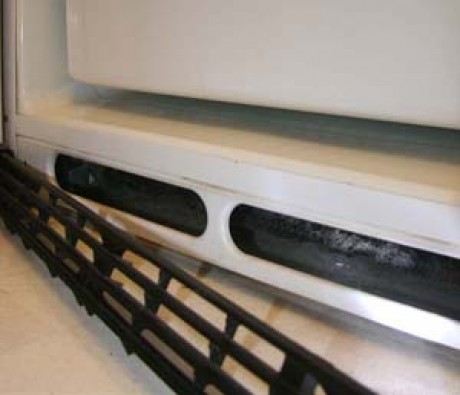Safe appliances, outlets and alarms
Keeping your appliances clean and testing your alarms and outlets helps keep your house safe

how-to's to keep your appliances, outlets and alarms working all year long.
Clean refrigerator coils
Refrigerators are one of the highest energy-consuming products in your home. In fact, if your current refrigerator was made before 1993, it uses twice the amount of energy used by new models.
Vacuum the coils every three months to eliminate dirt buildup that reduces efficiency and creates fire hazards. To clean condenser coils:
Step 1: Unplug the refrigerator.
Step 2: Pull or unscrew the vent plate that protects the coils.
Step 3: Clean the coils with a vacuum hose, using a brush to wipe off dust you can see.
Clean air = safe air
Air conditioners need to be cleaned at the beginning of every season to keep them running safely and efficiently. To clean your air conditioner:
Step 1: Shut off power to the unit and remove the filter cover.
Step 2: Use a vacuum extension brush on either the coils or the visible air fins.
Step 3: Pull out the filter and clean or replace according to the instructions in the manual.
Step 4: Outside, clear leaves and debris away from the condensing unit. Hose off dirt.
Outlet serves as fail-safe
Ground fault circuit interrupters (GFCIs) are designed to protect people from electrical shock and electrocution. A GFCI constantly monitors electricity flowing in a circuit. If it senses any loss of current, it quickly switches off power to that circuit.
GFCIs can be installed at the main service panel or in place of ordinary outlets. Typically, GFCIs are installed in areas where water and electricity mix in close proximity, such as a bathroom, garage, kitchen or basement.
GFCIs can be damaged or wear out due to voltage surges from lightning, utility switching or normal use. Just because an outlet works does not mean that the GFCI is functioning. GFCIs should be tested monthly to ensure they are in working condition.
Whether you have a receptacle-type or circuit breaker-type GFCI, pushing the "test" button should turn off the power of the circuit. Portable GFCIs should be tested before every use. Simply press the "reset" button.
Smoke alarms
On average, eight people die in a home fire each day in the U.S., for a total of nearly 3,000 fatalities every year. Roughly two-thirds of these deaths occur in homes without working smoke alarms. Smoke alarms save lives by providing early warning of fire. Newer smoke alarm recommendations and technologies provide greater levels of protection than ever before.
Smoke alarms should be installed in every bedroom, outside each sleeping area and on every level of the home.
Test smoke alarms monthly by pushing the "test" button or using other procedures recommended by the manufacturer. Smoke alarm batteries should be changed at least once a year. If an alarm "chirps" or "beeps" to indicate low batteries, change them right away. Replace all smoke alarms at least every 10 years.
Arc fault circuit interrupters
Arc fault circuit interrupters (AFCIs) replace standard circuit breakers in your home's electrical service panel. AFCIs provide a higher level of electrical fire protection, detecting hazardous arcing conditions traditional breakers were not designed to recognize, and shutting down the electricity before a fire can start.
AFCIs can stop working without showing signs of failure. Test AFCIs after installation and once a month to make sure they are working properly.
To test: Push the "test" button. The breaker handle should go to the middle or off position.
To reset: Move the breaker handle to the off position and then to the on position.
-
Share this story:



